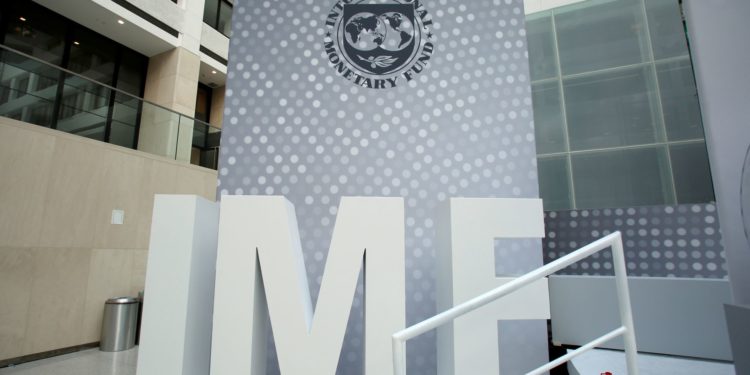Egypt gets breakthrough IMF deal to lift loan size to $8 billion
“Egypt’s international and regional partners will play a critical role in facilitating the implementation of the authorities’ policies and reforms,” the IMF said in the statement, adding that the UAE’s recent investment deal in Ras El-Hekma “alleviates the near-term financing pressures.”
- Advertisement -
Egypt and the International Monetary Fund agreed to more than double the country’s rescue program to $8 billion, the culmination of recent global efforts to stabilize the cash-strapped regional linchpin squeezed by wars and inflation.
The announcement followed swift moves earlier Wednesday to float the currency — tanking the pound as much as 38% — and hike interest rates by a record 600 basis points as the country led by President Abdel-Fattah El-Sisi has sought to meet longstanding economic reforms demanded from the IMF and backed by the US.
- Advertisement -
The IMF deal — as well as a crucial $35 billion recent investment commitment from the United Arab Emirates — underscores Egypt’s importance as a Middle East stalwart that’s too big to fail amid Israel’s war with Hamas and a conflict raging in neighboring Sudan.
- Advertisement -
Efforts to unlock the long-expected IMF loan and economic reforms were accelerated by the massive injection of cash from the UAE, via Abu Dhabi wealth fund ADQ, announced in late February.
El-Sisi’s government plays a key role alongside the US and Qatar in trying to halt the crisis in bordering Gaza and chart a two-state solution with Israel.
Egypt has also been particularly hammered by conflict in recent years, with Russia’s invasion of Ukraine driving up wheat and oil import prices that drained dollar reserves, and the spillovers from the Israel-Hamas war hurting tourism and Suez Canal fees, both crucial sources of hard currency.
“We are on the right track for the country to be economically stable and strong,” Central Bank of Egypt Governor Hassan Abdalla said Wednesday night in Cairo, adding that the bank didn’t intervene in the foreign exchange market earlier in the day as the pound tanked.
The currency flotation may stoke inflation that’s already running near 30% and hurt Egyptians in the short term. But authorities are banking on the reforms attracting foreign investors back to the country of 105 million people and ending its worst economic crisis in decades.
“This basically means that Egypt is in a better position to meet all its short-term debt obligations and in fact also access new debt including eurobonds,” said Bilal Bassiouni, head of Middle East and North Africa forecasting for consulting firm Pangea-Risk. “We believe Egypt will be one of the new clients for eurobonds in 2024.”
Egypt’s sovereign bonds have delivered total returns of 24% to investors this year, the second-best performer among peers in emerging markets, according to a Bloomberg index, amid expectations a deal with the IMF would be clinched and more dollars investments would flow in.
- Advertisement -
“A $35 billion bailout from the UAE has unlocked a policy chain reaction in Egypt today. The central bank has lifted interest rates. Authorities have floated the currency. The official exchange rate has converged to the black-market rate. And the country has agreed a deal with the IMF. The measures should unlock enough funds for Egypt to address its dollar shortages in the short term,” Ziad Daoud, chief emerging-markets economist
Egypt, already the IMF’s second-biggest borrower after Argentina, expects to get access to around $1.2 billion in additional financing from the lender, Prime Minister Mostafa Madbouly said during a briefing Wednesday. The country will also set a ceiling for total public investments at 1 trillion pounds ($20 billion) in the next fiscal year 2024-2025, according to Madbouly, “this includes all state’s entities,” he said.
The IMF also expects announcements soon on additional aid from “key partners,” the fund’s mission chief to the North African nation, Ivanna Vladkova Hollar, said in a separate briefing when asked about loans from its sister institution, the World Bank.
The pound earlier Wednesday dropped below 50 per dollar, having traded at about 30.9 for the past year. It started falling minutes after the central bank raised its main interest rate to a record 27.25% at an unscheduled meeting.
Most of Egypt’s sovereign dollar bonds rose, though they pared the morning’s gains. Longer-dated dollar bonds climbed the most, with notes due in 2050 rising as much as 3.5 cents on the dollar before trimming gains, according to indicative pricing data compiled by Bloomberg.
Economic reforms for Egypt’s program include “a move to a flexible exchange rate system, tightening of monetary and fiscal policies, and a slowdown in infrastructure spending,” the IMF said in a statement Wednesday. This can help “reduce inflation, and preserve debt sustainability, while fostering an environment that enables private sector activity,” it said.
The IMF also said it had reached a staff-level agreement with Egypt on two delayed program reviews on an earlier $3 billion loan secured more than a year ago. Payments on that loan, which has been expanded by the new program, were held up as the fund waited for authorizes to make good on reforms, including greater currency flexibility.
“Egypt’s international and regional partners will play a critical role in facilitating the implementation of the authorities’ policies and reforms,” the IMF said in the statement, adding that the UAE’s recent investment deal in Ras El-Hekma “alleviates the near-term financing pressures.”
- Advertisement -


